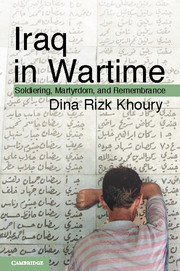Book contents
- Frontmatter
- Contents
- List of Illustrations, Maps, and Table
- Acknowledgments
- Note on Translations and Transliteration
- Maps
- 1 Introduction
- 2 Iraq’s Wars under the Ba‘th
- 3 The Internal Front
- 4 Battlefronts
- 5 Things Fall Apart
- 6 War’s Citizens, War’s Families
- 7 Memory for the Future
- 8 Commemorating the Dead
- 9 Postscript
- Appendix I Distribution in Percentage of Ba‘th Party Members, “Friends of Saddam,” and Martyrs in Fifteen Iraqi Provinces, 1998–1999
- Appendix II Percentage of Ba‘th Party Membership among Matriculating Students (Sixth Secondary) in Ten Iraqi Provinces, 1987–1988
- Appendix III Report Issued by Ali Hasan al-Majid, Head of the Northern Bureau of the Ba‘th Party to the General Secretariat, August 1987
- Sources and Bibliography
- Index
- References
7 - Memory for the Future
Published online by Cambridge University Press: 05 March 2013
- Frontmatter
- Contents
- List of Illustrations, Maps, and Table
- Acknowledgments
- Note on Translations and Transliteration
- Maps
- 1 Introduction
- 2 Iraq’s Wars under the Ba‘th
- 3 The Internal Front
- 4 Battlefronts
- 5 Things Fall Apart
- 6 War’s Citizens, War’s Families
- 7 Memory for the Future
- 8 Commemorating the Dead
- 9 Postscript
- Appendix I Distribution in Percentage of Ba‘th Party Members, “Friends of Saddam,” and Martyrs in Fifteen Iraqi Provinces, 1998–1999
- Appendix II Percentage of Ba‘th Party Membership among Matriculating Students (Sixth Secondary) in Ten Iraqi Provinces, 1987–1988
- Appendix III Report Issued by Ali Hasan al-Majid, Head of the Northern Bureau of the Ba‘th Party to the General Secretariat, August 1987
- Sources and Bibliography
- Index
- References
Summary
Like all states fighting national wars that require mass mobilization, the Iraqi government needed to generate consent among its citizenry to ensure their acquiescence to the costs of conflict with Iran. To that end, state cultural institutions and the Ba‘th Party created a public iconography and language to portray the experience of war as national and transformative. Two cultural idioms dominated the efforts to shape the narrative of the Iran-Iraq war. The first was bombastic, authoritarian, militant, and panegyric, particularly of Saddam Hussain. This idiom was assiduously reinforced in all public media outlets and in the visual arts. At its center was Saddam Hussain, who was portrayed as leading a new generation of men and women in a war that would give birth to a militant Iraq that would spearhead Arab and anti-imperialist struggles. He stood for all aspects of the nation – its ancient past, its contribution to Arab-Islamic civilization, and its “revolutionary” present. Like a good revolutionary, he embodied all Iraqi classes and ethnicities. He was a peasant and tribal leader, an educator to his middle classes, and an intellectual and military planner. Above all, he was the embodiment of the ideal soldier who merged all these attributes in his person.
The extent to which this project to link the war and its conduct to the person of Saddam Hussain carried resonance with the population is difficult to gauge. As Eric Davis has concluded in his study of public culture during this period, the personalization of the war undermined the narrative of an Iraqi state as the caretaker and protector of a diverse nation in favor of an exclusivist narrative of Iraqi national history focused on Saddam Hussain and the Ba‘th.
- Type
- Chapter
- Information
- Iraq in WartimeSoldiering, Martyrdom, and Remembrance, pp. 181 - 218Publisher: Cambridge University PressPrint publication year: 2013



